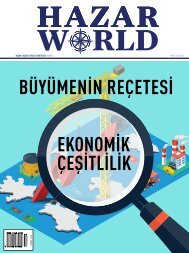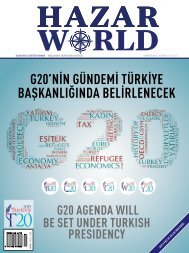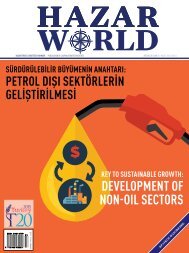Create successful ePaper yourself
Turn your PDF publications into a flip-book with our unique Google optimized e-Paper software.
DOĞRUDAN YABANCI SERMAYE YATIRIMLARI / FOREIGN DIRECT INVESTMENTS<br />
in the world are developing countries as of<br />
2014. Foreign direct investments in developing<br />
countries are increasing but all countries<br />
in this category do not enjoy the same level<br />
of investments. There is approximately 33<br />
billion USD increase in foreign direct investments<br />
to East and Southeast Asia states,<br />
whereas many other developing countries<br />
have less foreign direct investment. For<br />
instance, it is striking to see 27 billion USD<br />
decline in foreign direct investments to<br />
Latin America states, particularly Brazil and<br />
Mexico in 2014. It should also be noted that<br />
foreign direct investments in Russia have<br />
decreased from 69 billion USD to 21 billion<br />
USD. Turkey, on the other hand, has not<br />
received its share from the increase in the<br />
grand total as the investments of 2014 were<br />
1.1 billion USD lower than the previous year.<br />
ifade ediyor? 2014 yılında sert bir şekilde<br />
küçülen doğrudan yabancı yatırımlar,<br />
<strong>2015</strong> ve sonrasında toparlanma gösterecek<br />
ve muhtemelen gelişmekte olan ülkeler<br />
göreceli olarak yüksek büyüme oranları<br />
ile bu yatırımların ana odak noktası olmaya<br />
devam edecek. Fakat 2014 yılına ait<br />
rakamlarda da görüldüğü üzere bütün gelişmekte<br />
olan ülkeler bundan aynı oranda<br />
ve yönde faydalanamayacak. Gelişmekte<br />
olan ülkeler ekonomik potansiyelleri<br />
nedeniyle cazip konumlarını sürdürecek<br />
fakat yatırımcılar bu ülkeler arasında<br />
seçici davranmaya devam edeceklerdir.<br />
Brezilya, Türkiye, Hindistan, Güney<br />
Afrika ve Endonezya gibi yatırım-tasarruf<br />
açığı problemi olan, dolayısıyla yatırım<br />
ve büyümeyi finanse edebilmek için yabancı<br />
tasarruflara muhtaç durumda olan<br />
ülkeler için büyüyen pastadan pay almak<br />
daha fazla önemli olacak. Dolayısıyla<br />
Türkiye’nin de dâhil olduğu bu ülkeler<br />
grubu için daha fazla doğrudan yabancı<br />
yatırım çekebilmek adına doğru ekonomi<br />
politikalarının geliştirilmesi ve yatırım<br />
ortamının iyileştirilmesi daha önemli hale<br />
gelecek. Yine bu ülkelerde kurumsal altyapının<br />
güçlendirilmesi ve başta hukuk<br />
ve eğitim alanında olmak üzere yapısal<br />
reformların yapılması uzun vadede daha<br />
fazla doğrudan yabancı yatırım çekilebilmesi<br />
adına önemli başlıklar. Bunlar<br />
başarılabildiği takdirde Asya ülkelerinde<br />
görüldüğü gibi bu ülkelerde de doğrudan<br />
yabancı yatırımlar büyüme ve istihdamın<br />
önemli bir unsuru haline gelecektir.<br />
DOĞRUDAN YABANCI<br />
YATIRIMLAR, <strong>2015</strong> VE<br />
SONRASINDA<br />
TOPARLANMA<br />
GÖSTERECEK.<br />
FOREIGN DIRECT<br />
INVESTMENTS ARE<br />
EXPECTED TO<br />
RECOVER IN <strong>2015</strong> AND<br />
BEYOND.<br />
INVESTORS WILL BE MORE SELECTIVE<br />
Well, what do these foreign direct investment<br />
figures mean particularly to developing<br />
countries? Foreign direct investments<br />
had a sharp decrease in 2014, but it is<br />
expected that the numbers will recover in<br />
<strong>2015</strong> and beyond, and probably developing<br />
countries will continue to be the center of<br />
these investments with their relatively high<br />
growth rates. However, as can be seen in the<br />
2014 data, all developing countries will not<br />
benefit from this increase evenly and in the<br />
same direction. Developing countries will<br />
preserve their attractive position with their<br />
economic potentials, but investors will continue<br />
to be selective among these countries.<br />
It will be even more vital to have a share in<br />
this growing pie for the countries which<br />
have an investment-saving deficit and<br />
thus which are in need of foreign savings<br />
to finance investments and growth, such<br />
as Brazil, Turkey, India, South Africa<br />
and Indonesia. Therefore, it will be more<br />
important for those countries to develop<br />
effective economy policies and improve<br />
the investment environment in order to be<br />
able to attract more foreign direct investment.<br />
Besides, strengthening the corporate<br />
infrastructure and making structural<br />
reforms particularly in the fields of<br />
education and law are significant steps<br />
to increase the foreign direct investment<br />
appeal of those countries in the long run.<br />
When these important steps are achieved,<br />
foreign direct investments will be a key<br />
factor for growth and employment in<br />
those countries, just like the previous<br />
experience of Asian countries.<br />
14 <strong>EKİM</strong> <strong>2015</strong> <strong>SAYI</strong> <strong>35</strong> - OCTOBER <strong>2015</strong> ISSUE <strong>35</strong>
















